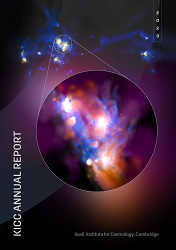
Submitted by S. Brereton on Thu, 18/01/2024 - 12:15
One of the key missions of the NASA/ESA/CSA James Webb Space Telescope is to probe the early Universe. Now, the unmatched resolution and sensitivity of Webb’s NIRCam instrument have revealed, for the first time, what lies in the local environment of galaxies in the very early Universe.This has solved one of the most puzzling mysteries in astronomy; – why astronomers detect light from hydrogen atoms that should have been entirely blocked by the pristine gas that formed after the Big Bang.
Read more about this story here
These findings have been published today in Nature Astronomy.
Image Credit: ESA/Webb, NASA & CSA, S. Finkelstein (UT Austin), M. Bagley (UT Austin), R. Larson (UT Austin), A. Pagan (STScI), C. Witten, M. Zamani (ESA/Webb)


